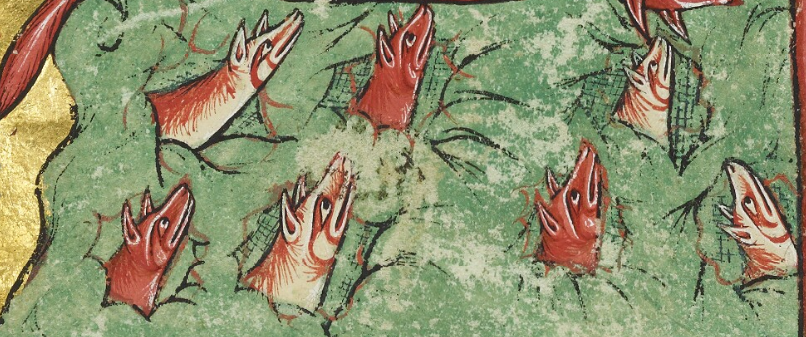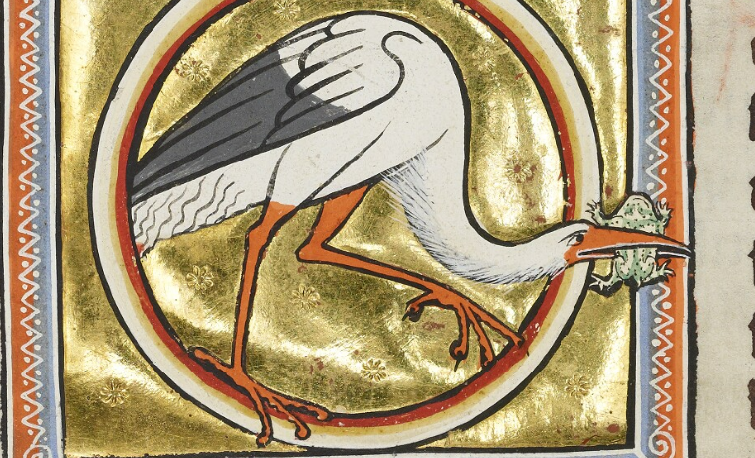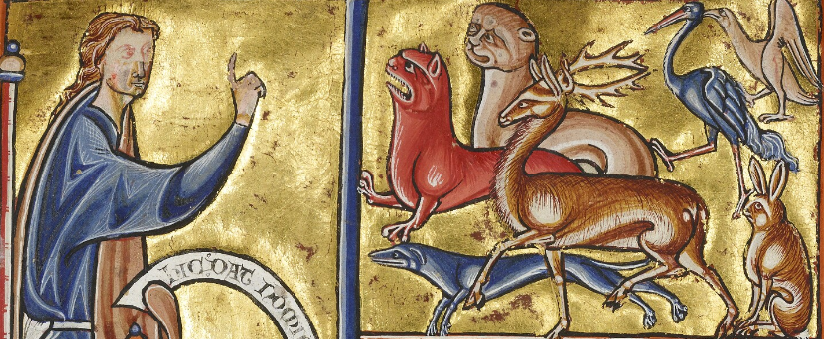Welcome back to Oxford, and to Hilary term! I hope that you all had a peaceful and enjoyable vac, and are returning to Oxford well rested and ready for an exciting and busy term. Since many of you have newly returned to Oxford, here is some wisdom for Alcuin about returning:
ex pietatis vestre apicibus audita prosperitate itineris vestri atque reversionis in patriam … toto cordis affectu animoque letissimo gratis egi
[Hearing from your letter of your successful journey and your return to our country … I gave heartfelt and joyful thanks, Ep. 190]
To welcome you all back, we have a new medieval booklet for Hilary 2023: please find a pdf copy attached to this week’s email, and a high-quality version on our website here. We also have a special blog post by Laure Miolo, who has the honour of giving the first medievalist paper of the term, at the Seminar in Manuscript Studies and Palaeography, today at 2.15-3.45pm! To read more about Laure’s paper, see the blog post.
Please note also that this week’s Medieval Church and Culture Seminar, on Tuesday 5pm, Harris Manchester College, is a special medievalist social! Please do come along to enjoy tea, coffee, biscuits, and a chance to catch up / advertise your seminars and events! All very welcome.
Please see below for full details of the week’s events:
ANNOUNCEMENTS:
- Workshop: Staging a Medieval Mystery Play: On Friday 3 February 2023 (Week 3), 5–6.30pm, at St Edmund Hall, Old Dining Hall (postponed from 20 January). Join this workshop for tips and guidance on how to adapt medieval mystery plays for modern performance or if you are just interested in taking part in some form and shape. The workshop will be led by David Wiles, Emeritus Professor of Drama at the University of Exeter and a veteran director of the Oxford Medieval Mystery Cycle. Let us know if you’re interested in joining by emailing Michael Angerer, the graduate convenor. Meanwhile, we’re still looking for groups to join the Medieval Mystery Cycle: have a look at the original blog post with the sign-up link!
- Save the Date! The Oxford Medieval Graduate Conference 2023 will take place on 20th-21st April at Ertegun House and online. For more details, visit oxgradconf.wixsite.com/omgc or follow @OxMedGradConf on twitter.
- The Oxford Interfaith Forum runs its signature Thematic International Interfaith Groups, and our several groups, such as Manuscripts in Interfaith Context, Sacred Literature in Interfaith Contexts, Mysticism in Interfaith Contexts, Eastern Christianity in Interfaith Contexts, etc. Events organised by these groups might be of interest to the Medieval Studies Network, e.g. the Psalms in Interfaith Context Series. The full details of our past and upcoming events are available on our website, or follow us on Twitter at @FaithsOxford.
- The OMS Small Grants Hilary Term Applications are now open! The TORCH Oxford Medieval Studies Programme invites applications for small grants to support conferences, workshops, and other forms of collaborative research activity organised by researchers at postgraduate (whether MSt or DPhil) or early-career level from across the Humanities Division at the University of Oxford. For full details, please see our blog post.
EVENTS THIS WEEK:
Monday 16th January:
- The Medieval Latin Manuscript Reading Group led by Matthew Holford and Andrew Dunning is meeting as usual via Teams from 1-2pm. We’ll start this term continuing the natural history theme with another text on elephants, this time from the encyclopaedia of Thomas of Cantimpre (1201-?1272), De naturis rerum. We’ll read it from a 14th-century copy now in Bruges Public Library, https://sharedcanvas.be/IIIF/viewer/mirador/B_OB_MS412, with the text starting on fol. 61v. Sign up for the mailing list to receive updates and the Teams invite, or contact matthew.holford@bodleian.ox.ac.uk or andrew.dunning@bodleian.ox.ac.uk for more information.
- The Seminar in Manuscript Studies and Palaeography will take place at 2.15-3.45pm, in the Weston Library, Horton Room. This week’s speaker will be Laure Miolo (University of Oxford), “Astronomy and astrology in fourteenth-century Oxford: MS. Digby 176 in context“. For further information contact matthew.holford@bodleian.ox.ac.uk or andrew.dunning@bodleian.ox.ac.uk
- The Medieval History Seminar takes place at 5pm in the Wharton Room, All Souls College and on Teams (Teams link here). This week’s speaker will be Lorenzo Caravaggi (University of East Anglia), ‘Magic Saracen treasures, credulous merchants, and other stories: itinerant notaries and their “judicial novellas” in fourteenth-century Italy.’. The Teams session can be accessed by logging in to Teams with your .ox.ac.uk account and joining the group “Medieval History Research Seminar” (team code rmppucs). If you have any difficulties please email: medhistsem@history.ox.ac.uk
Tuesday 17th January:
- The Europe in the Later Middle Ages Seminar will take place at 2–3.30pm in the New Seminar Room, St John’s College. Tea and coffee available from 1.45pm. This week’s speaker will be Christopher Fletcher, CNRS, Lille, ‘The politics and anti-politics of labour in late medieval England‘.
- The Medieval Church and Culture Seminar meets at 5-6pm in the Charlese Wellbeloved Room, Harris Manchester College. This week’s meeting is a special medievalist social! Come along for tea, coffee, biscuits and a chance to share ongoing research, catch up informally, and give suggestions for themes and speakers in coming terms. All are welcome.
Wednesday 18th January:
- The Medieval German Graduate Seminar will meet at 11:15am in the island room of Oriel College for a short organisational meeting on this term’s text, Heinrich von Neustadt’s Apollonius von Tyrland. If you are interested, contact Henrike Lähnemann, to be added to the teams chat.
- The Medieval Italian Seminar will take place at 2pm at Rees Davies Room, History Faculty. This week’s speaker will be Chris Wickham (Oxford, All Souls/ History Faculty): ‘Governing twelfth-century city communes’.
- GLARE (Greek and Latin Reading Group) takes place at 4-5pm at Jesus College. Please meet at Jesus College Lodge. This week’s text will be Cicero, Letters to Atticus. All welcome to attend any and all sessions. For more details and specific readings each week, or to be added to the mailing list, email john.colley@jesus.ox.ac.uk or jenyth.evans@seh.ox.ac.uk.
- The Medieval Latin Document Reading Group meets on Teams at 4-5pm. We are currently focusing on medieval documents from New College’s archive as part of the cataloguing work being carried out there, so there will be a variety of hands, dates and types. A document is sent out in advance but homework is not expected. Contact Michael Stansfield (michael.stansfield@new.ox.ac.uk) for further details and the Teams link.
- The Late Antique and Byzantine Seminar takes place at 5pm at the Ioannou Centre for Classical and Byzantine Studies, 66 St Giles and online via Teams. This week’s speaker will be Joshua Hitt (St Hilda’s College), ‘The Poetics of Age in Twelfth-Century Byzantine Literature’. Teams: Click here to join the meeting.
- The Medieval English Research Seminar takes place at 5.15pm in Lecture Theatre 2, English Faculty. This week’s paper will be followed by a special drinks reception to celebrate recent book publications. This week’s speaker will be Luisa Ostacchini (University of Oxford), ‘After Dido: Carthage in Old English Literature’. All welcome.
- CfP: The Medieval Church: From Margins to Centre (26-27 June 2023): This conference aims to consider the relationship between the Church and the marginalised in medieval society – minority genders and sexualities, racial minorities, disabled people, non-Christians, and the poor. The conference is prompted by current trends in medieval race studies, trans studies and disability studies, and aims to provide a particular platform for postgraduate and early career researchers who work in these areas. To support this aim, we plan to offer a bursary of £30 per person for up to 10 postgraduates and ECRs. Please send abstracts of up to 250 words to Tim Wingard (tim.wingard@york.ac.uk) by no later than 5pm on Sunday 5 February 2023. For more information, see the website here.
Friday 20th January:
- The Anglo-Norman Reading Group meets at 5-6.30pm at St Hilda’s College, in the Julia Mann Room. The text will be extracts from the Chronicle of Langtoft; pdf will be provided. For access to the text and further information, please email: stephanie.hathaway@gmail.com or jane.bliss@lmh.oxon.org.
- The Old Norse Reading Group meets at 5pm at The Royal Oak. Please email Ashley Castelino (ashley.castelino@lincoln.ox.ac.uk) to be added to the mailing list.
OPPORTUNITIES:
- CFP: Old Norse Poetry in Performance: Inheritance and Innovation. Following its covid-induced hiatus, the third iteration of the triennial Old Norse Poetry in Performance conference will take place at St Hugh’s College, Oxford, on the 21st and 22nd of June 2023. This conference will maintain the format of its previous iterations, showcasing academic research, practical performances, and the possibilities offered by combining the two. The organisers invite proposals for 20-minute papers and/or performances. Proposals should be no more than 300 words and should be sent to oldnorsepoetryinperformance@gmail.com, accompanied by a brief biographical note, by midnight on 17th February 2023. For full details, see the blog post.
- Workshop on manuscript description and cataloguing: This workshop, to be held over 3-4 weeks in the second half of term, is intended for postgraduate students working on Western medieval manuscript/s in the Bodleian Library who would like, as a by-product of their research, to produce formal catalogue description/s for publication on Medieval Manuscripts in Oxford Libraries. Please express interest using this form.
- Teaching with manuscripts: Thinking of incorporating medieval manuscript material in your teaching but not sure where to start? Sign up for a workshop with Andrew Dunning and Matthew Holford, curators at the Bodleian Library, where we will try to answer your questions and lead a discussion on what does and doesn’t work when teaching with manuscripts. Please sign up using this form. We will hold one or more workshops (depending on interest) early in term.
- The Latin Works of Piccolomini (Pius II): A Colloquium: Registration is now open for this colloquium, taking place on Thurs. 23–Fri. 24 March 2023 at the Faculty of Classics, Oxford in collaboration with the Abteilung für Griechische und Lateinische Philologie at Friedrich-Wilhelms-Universität, Bonn. More information and the link to register here.
- CFP: Bristol CMS Postgraduate Conference, IDENTITIES, COMMUNITIES AND ‘IMAGINED COMMUNITIES’, 14-15 April 2023. We welcome abstracts from postgraduates and early-career researchers, exploring all the aspects and approaches to concepts of identity and communities, in all relevant disciplines pertaining to the medieval period, broadly construed c.500-c.1500. Abstracts are 300 words for 20-minute papers. This year’s conference will be a hybrid event online and on the campus of the University of Bristol. Abstracts and enquiries: cms-conferenceenquiries@bristol.ac.uk DEADLINE: 10 February 2023. For full details, see the blog post here.
Finally, some more wisdom from Alcuin:
novi rerum eventus novos iterum caritatis penna exarare meam devotionem apices exhortantur
[New events urge me to write anew in devotion with the pen of love, Ep. 156]
I’m delighted to be writing anew to you all with the week’s round-up of events, announcements and opportunities, and look forward to seeing you all throughout the term. Wishing you all a productive and enjoyable Hilary!

Ashmole Bestiary, Bodleian Library MS. Ashmole 1511, f. 69 r.
Viewable in full at Digital Bodleian


















